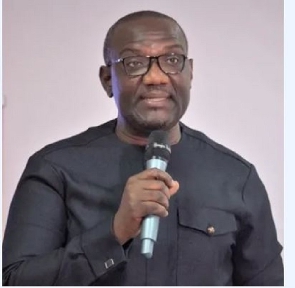 Executive Secretary of the Energy Commission, Oscar Amonoo-Neizer
Executive Secretary of the Energy Commission, Oscar Amonoo-Neizer
The country requires over US$ 562 billion to achieve its net zero carbon emission target by 2070, Executive Secretary of the Energy Commission, Oscar Amonoo-Neizer, has said.
The Energy Commission Chief said the programme was initiated in 2020 and is a long-term framework with an estimated 200 metric tonnes of carbon dioxide target throughout the 50-year period.
“Looking at the amount of money needed, the carbon market implementation will help to alleviate some of the financial burdens to accelerate getting to the goal. This is the same in most African countries,” he said.
Amonoo-Neizer was addressing colleague industry players at PwC West Africa’s Climate Change & Sustainability webinar, themed ‘Post-COP27: Outcomes and next steps.
He however explained that fossil fuels, especially natural gas, will continue to be part of Ghana’s energy mix in the short term, adding: “Energy transition could come with challenges, including lower demand in the downstream petroleum sector.
“It is important for the African continent to focus on innovation and diversification to thrive and mitigate the impact of transition,” he added.
Dr Muntaqa Umar-Sadiq, Head-Nigeria Energy Transition Office, explained that his country is pitching for an initial US$ 10 billion from international funders to kick-start an energy transition plan.
According to him, Nigeria aims to put itself on a path to achieve net zero emissions by 2060 with an array of strategies including reliance on gas as a transitional fuel.
Dr Mutanga said a price tag of US$ 410 billion has been estimated for key strategies to enable Nigeria – a far bigger economy than Ghana – to reach net zero by 2060.
Net zero refers to the balance between the amount of greenhouse gas produced and that removed from the atmosphere. Net zero is reached when the amount of carbon added is no more than the amount taken away.
Background
At the 27th Conference of Parties (COP27), which was held in November 2022 in Egypt, several commitments were made to accelerate corporate and country actions for climate change. The PwC webinar, therefore, brought stakeholders from Nigeria and Ghana to engage around the key takeaways from COP27.
These included implications of COP27’s commitments and expectations from the public and private sectors in achieving the climate change agenda, especially over the next 12 months.
Other key speakers at the webinar included Dr Daniel Tutu Benefoh, Ag. Director-Climate Change Unit, Environmental Protection Agency, Ghana; Dr Ndidi Nnoli-Edozien, Member-International Sustainability Standards Board (ISSB); Dr Salisu Mohammed Dahiru, Director-General/Chief Executive Officer, Nigeria’s National Council on Climate Change (NCCC); and Muhammad Wakil, CFA, Country Representative-Global Energy Alliance for People and Planet (GEAPP), Nigeria.